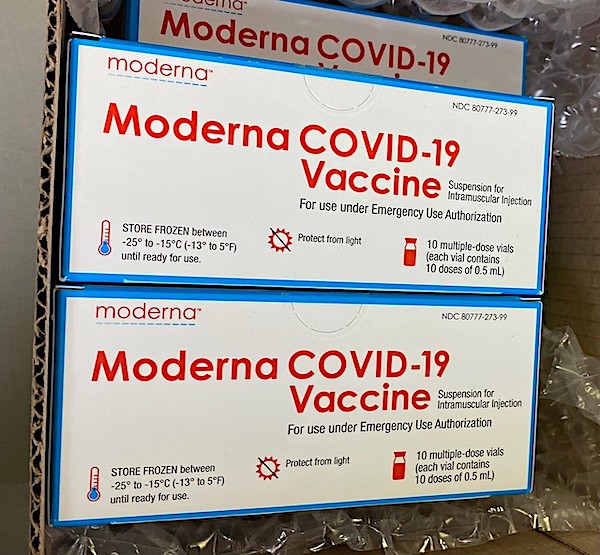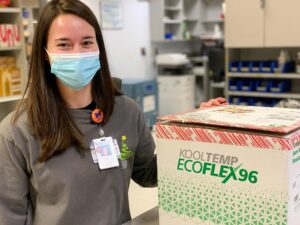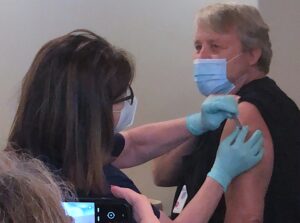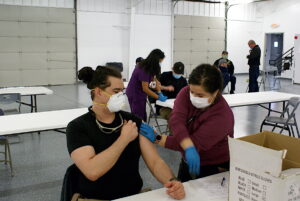
Vials of COVID-19 vaccine have been arriving at medical facilities across Georgia over the past two weeks.
But the inoculation process itself has not always gone smoothly here, with logistical challenges and even some ethical concerns, according to health care providers.
Still, physicians and medical organizations contacted by GHN expressed relief and excitement over the availability of shots from two approved vaccines, one produced by Pfizer and the other by Moderna.
What medical providers also say is that many health care workers — part of a group targeted for the first round of vaccinations — have declined to get the shots.
“We’re seeing a noticeable amount of resistance of people to take the vaccine,’’ said Steven Miracle of Georgia Mountains Health Services, which has begun administering shots to health care workers at their Ellijay, Blue Ridge, and Dahlonega sites in North Georgia.
Hospitals, clinics, nursing homes, doctors’ offices and public health sites have received shipments. But not all who have ordered doses have gotten them – at least not in the quantities requested.

Rural areas appear to be getting shipments more slowly.
Distribution has been uneven among rural hospitals, says Jimmy Lewis, CEO of HomeTown Health, an association of such medical centers in the state.
And after top-priority recipients in an area get the shots, there are questions about what to do with the vaccine that’s left.
Dr. Karen Kinsell, a Clay County physician, faced such a question. After getting a supply of vaccine, she administered doses to medical staffers, who are in the “1A” category along with long-term care residents, meaning they are designated for the initial round of shots. But when she had extra doses left over, she started vaccinating ordinary people 75 and older in her community. (Such people are at high risk but are not in the “1A” group.)

Karen Kinsell treating a patient in 2016
“We are in the middle of a global and state pandemic,’’ Kinsell said. “I cannot ethically sit on vaccine that could be used to save lives here. Unless someone tells me that they need to pick up the 140 doses we have left and ship them to an area where health care providers are going without, I want to dispense these here over the next few days. ‘’
She said Public Health officials have told her that the state is still in phase 1A. But Public Health, when asked by GHN about the status of leftover vaccine, said the issue is under discussion.
“We do not want vaccine to be wasted or go unused when there are so many people to be vaccinated,’’ said Nancy Nydam, a spokeswoman for the state agency. “However, there are many things to be considered, including transfer of vaccine from one provider/area to another, and how to ensure administration to individuals in other phases is fair and equitable, and based on risk of exposure and transmission.’’
A strain on a burdened system
The vaccine effort represents a tremendous challenge for Public Health, which is chronically underfunded and is dealing with other virus imperatives – tracking cases and overseeing contact tracing – along with its regular functions.
“There likely isn’t the funding nor the infrastructure to support a statewide vaccination rollout at the speed that any of us would see as reasonable,’’ said Amber Schmidtke, a microbiologist whose Daily Digest tracks COVID in Georgia. “The coronavirus relief bill that was signed into law includes $8 billion for vaccine distribution, but we don’t yet know how that money will be allocated to the states.’’
And nationally, distribution of the Pfizer and Moderna vaccines has been unexpectedly — and disappointingly — slow.

The CDC said that 12.4 million doses have been distributed, and 2.6 million vaccinations have been administered by Wednesday morning.
The United States won’t come close to vaccinating 20 million people by Jan. 1 as many experts had forecast. But Dr. Anthony Fauci, a leading infectious disease expert, said he believes “an increase in momentum” next month will help the nation draw closer to rollout estimates.
President Trump criticized states for the slow rollout of COVID-19 vaccinations.
“The Federal Government has distributed the vaccines to the states. Now it is up to the states to administer. Get moving!” Trump tweeted Wednesday morning.
The tweets followed President-elect Joe Biden’s claim that the Trump administration’s effort to vaccinate Americans against the coronavirus “is falling behind, far behind.”
The logistical challenges have been daunting from the start. Dr. Elizabeth Rosenthal, in a New York Times editorial last week, warned that “even before there was a vaccine, some seasoned doctors and public health experts warned, Cassandra-like, that its distribution would be ‘a logistical nightmare.’ After Week 1 of the rollout, ‘nightmare’ sounds like an apt description.’’
Georgia Public Health reported that as of late Wednesday, 61,870 people had been given shots, while more than 370,000 doses had been received in the state.

The number vaccinated “is likely underreported due to a lag time in reporting by providers,’’ who may be having trouble navigating the immunization tracking system, said Nydam, the Public Health spokeswoman.
“Hospitals are currently overwhelmed with COVID patients and may not have the staff to administer vaccine or the opportunity to be vaccinated themselves. Add to that the holidays – health care workers may be off and/or provider offices are closed or have reduced hours. And there are some health care workers who do not want to be vaccinated.’’
Vaccination has only just begun in long-term care facilities in Georgia, with partners CVS and Walgreens administering shots in these locations, Nydam noted. Through that effort, she said, the number of vaccine doses administered will increase.
There are practical challenges with the vaccine program, and they extend to the level of the individual medical practice.
Dr. Joe Stubbs, an Albany internist, said the COVID vaccinations are much harder to administer than a flu shot.
Before giving the shots, staffers have to determine which people are priority recipients, said Stubbs, whose practice is in the process of registering as a vaccine provider. They then have to screen patients for potential COVID. A nurse has to administer the shot, Stubbs added, and after the inoculation, the patient must be under observation for 15 minutes.
Then there’s the expiration time for the vaccine.
With the Moderna vaccine, once a vial has been punctured, there are 10 doses available, Miracle said. But the provider has just six hours to use it.
So many factors to be weighed
State officials say that allocation of vaccine to providers depends on factors such as the number of people to be immunized, previous allocation of doses, geographic and access considerations and — in the case of Pfizer’s vaccine — the requirement for ultracold storage. (Ultracold freezers, used in scientific work, are much colder than commercial food freezers and are uncommon.)
The Medical Association of Georgia said Tuesday that the vaccine process “has been smoother for physicians who are affiliated with or employed by large health care systems or hospitals.’’

Physicians are administering the vaccinations based on guidelines established by the state and federal governments, MAG said. But it also noted that a doctor at an independent practice in a rural area has reported that they still do not know when they will receive the vaccine “despite going through all of the requisite [Public Health] steps.”
The president of the Georgia Academy of Family Physicians, Dr. Thomas D. Fausett Jr., said, “I think the system is still shaking out the kinks, especially since Moderna was just approved and most rural areas requested it, as it’s easier to store” than the ultracold Pfizer variety.
Georgia began vaccinating nursing home residents Monday in Gainesville, but it may be the end of January before most long-term care residents and staff in Chatham County get their vaccines, the Savannah Morning News reported.
The distribution and allocation of the vaccine in this initial Phase 1A “is a monumental task,’’ said Greg Reybold of the Georgia Pharmacy Association. More than 30 pharmacies statewide have received doses, he said. “I’ve been impressed with the job the state, and DPH in particular, has done so far in terms of incorporating community pharmacies throughout the state,’’ he said.
Grady Health System told GHN that it has received enough vaccine doses to distribute to employees, medical staff, and contractors who want to get it. Grady has also started the vaccinations at its long-term care facility, Crestview.
 “There is some vaccine resistance,’’ Grady said in a statement Wednesday. “However, we continue to educate our teams on the safety and efficacy of the vaccine we have received.’’
“There is some vaccine resistance,’’ Grady said in a statement Wednesday. “However, we continue to educate our teams on the safety and efficacy of the vaccine we have received.’’
Georgia hospitals are not requiring employees to be vaccinated, industry officials say.
While many health care workers have rejected the vaccine, the public demand for the shot is high, doctors say.
“I’m getting about 15 calls a day,’’ said Dr. Stubbs, the Albany physician.
Medical providers are being told not to hold back half of the doses for the second round of shots for people taking the Pfizer and Moderna vaccines. Each requires two doses about three to four weeks apart.
Vaccine earmarked for second doses will ship this week, Nydam said.
Limited guidance
Dr. Kinsell and Miracle said that when the shipments first arrived, there were no explicit directions included with them.
“There was no clear instruction,’’ Miracle said. “The expectation was to follow the Department of Public Health guidelines.’’
The guidelines to enroll as a vaccine provider direct medical personnel to follow that state framework, Public Health said.
 The Georgia Mountains Health staff has received the shots. “On Monday, we began calling around to physician offices and EMS [in the community] and telling them that vaccine is available,’’ Miracle said.
The Georgia Mountains Health staff has received the shots. “On Monday, we began calling around to physician offices and EMS [in the community] and telling them that vaccine is available,’’ Miracle said.
Like other practices, Georgia Mountains Health isn’t charging patients for an administration fee for getting the shot.
An Atlanta physician, Dr. Melanie Thompson, said she is grateful that Fulton County “prioritized and rapidly rolled out vaccines for independent health care providers. My entire group was vaccinated last Saturday, including clinical staff and administrative staff who serve patients. At the same time, however, we’re aware that some health care workers in hospital ERs have not yet been vaccinated.’’
“We do need to be able to see the demographics and geography of vaccine recipients so we can monitor whether health inequities are being addressed,’’ she added.
And at East Georgia Healthcare Center, CEO Jennie Wren Denmark said just one of its three sites that were approved to administer shots had received any vaccine.
The two sites that have not received vaccine have been designated for Pfizer’s version, the one that must be stored in an ultracold freezer.
“They know we don’t have’’ that kind of freezer, Denmark said.
State officials, though, said providers set to use Pfizer’s vaccine must have an ultracold freezer or find a way to obtain one. The state does not buy such freezers for providers, the officials said.

Swainsboro is in Emanuel County
The center’s Swainsboro site, meanwhile, is administering the Moderna vaccine to medical workers. Some have come from as far as an hour away, Denmark said.
There’s been some reluctance among the staff, she added. “I feel like that’s going to change because there have been no side effects.’’
There’s considerable demand for the vaccine among communities they serve, Denmark said.
It could help end the months-long COVID nightmare.
She said eight East Georgia Healthcare employees have COVID and are not working. “We’re struggling,’’ Denmark said. “Our people are tired. The fact that something can stop it is a big deal.’’







